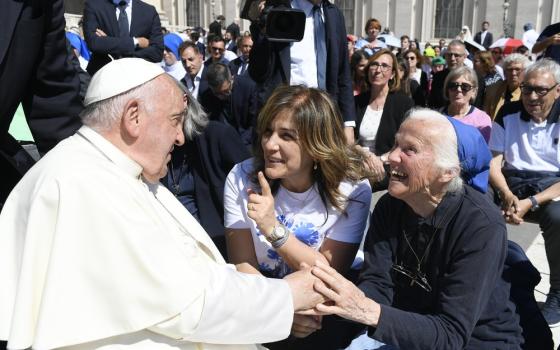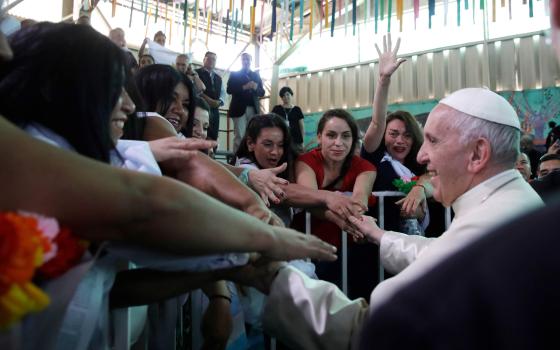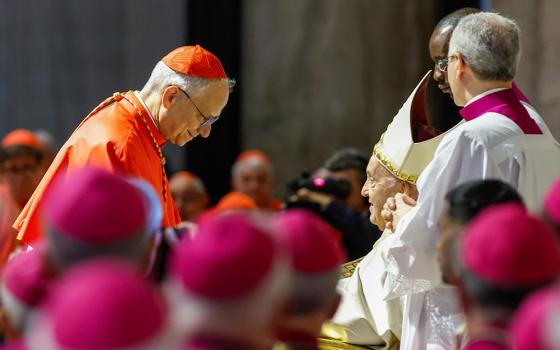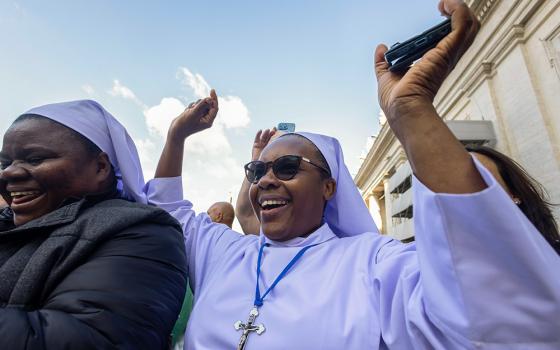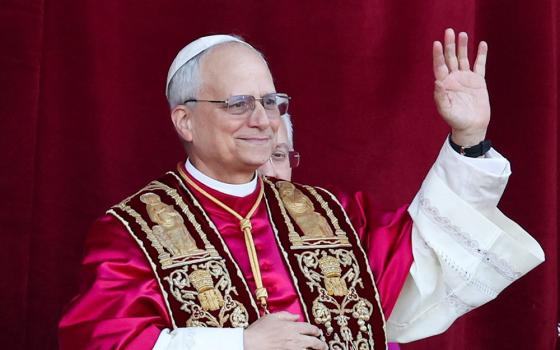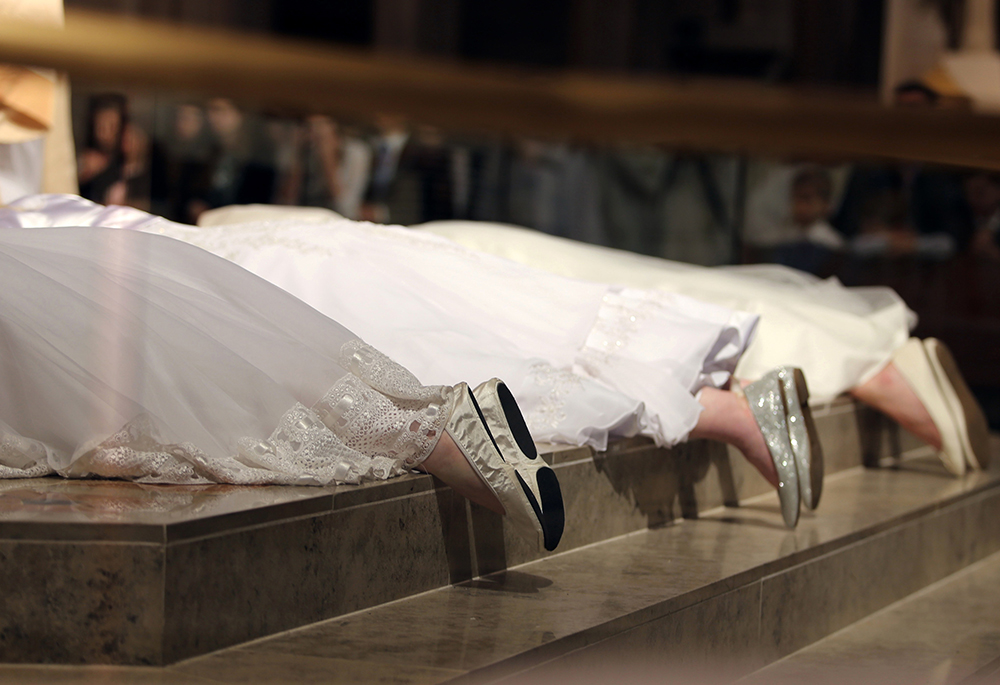
Recently, I've been having some interesting encounters with religious, especially during church gatherings. Just to break the ice, it's common to ask about each other's name, institute, charism, and involvement in ministry.
Since I introduce myself as a consecrated virgin, such conversations usually include questions and clarifications regarding this little-known and much-misunderstood vocation. There are also comments regarding whose way of life seems more relevant for contemporary contexts and the future. Unexpectedly, for each one the grass seems to look greener on the other side, in some aspect or other.
This wasn't the trend 20 years ago, when most sisters sincerely believed religious life in convents was the only alternative to marriage and were unaware about other canonical and public forms coexisting under the umbrella of consecrated life with Jesus (our "J" hub) keeping us together!
Today, new acquaintances express amazement and curiosity about my vocation in the Ordo virginum ("order of virgins"), often requesting more information and exchanging phone numbers so we could become friends. Is the Spirit inspiring us to widen the space of our tent, to accompany and encourage each other by doing a synthesis of some of our "existential" realities?
(I've intentionally not mentioned synthesis of the "central elements" of our vocations because we already share "one beating heart" in our union with God as consecrated persons and are called to serve, although with some nuances in our identities and rites of profession/consecration. Besides, mine is the earliest form of consecrated life in the history of the church, and kind of also the seed of all other forms that evolved and coexist today.)
Religious life in the West is discerning its future and moving away from heavy institutionalism and regimented lifestyles with traditional ministries. It's not uncommon any more for religious sisters to live alone or with one or two companions from the same or other institutes and take up ordinary jobs to earn a living. Moreover, they are adapting their personal prayer, dress and rule of life as a community to demands placed by their services to church and society.
This is also how consecrated virgins live today, despite being dedicated to the service of the church (Canon 604). Earning one's own living and being responsible for one's social security is the norm, with exceptions when consecrated virgins decide to form canonically public or private associations to live together and/or pool their resources. Some diocesan bishops provide a home for consecrated virgins.
Despite these similarities, the Ordo virginum amazingly is one of the fastest growing vocations in the West, while religious institutes are numerically declining. Obviously, this has little to do with wearing or not wearing a habit.
Advertisement
Most of us neither desire nor are asked by our bishops to wear habits, except in some parts of Africa and Europe. Some wear it only for church gatherings. It depends upon each one's cultural context.
Though critics argue that habit-wearing religious institutes are attracting relatively more vocations, I think it's because candidates are looking for clearer identities and public recognition in this constantly changing world. The need to wear a habit could indicate deeper issues requiring attention in formation.
Moreover, consecrated life is experiencing tension between the "sacred" and "secular" (although the secular is also sacred theologically). Conservative and progressive institutes are polarized over traditional customs and interactions with science and society. This phenomenon is spreading to Asia.
If you're fed up with wearing a veil, blame the ancient rite of consecration of virgins for the origins of this subjugating custom, which is not followed in daily life, though. Paradoxically, if you're dreaming of a future without vows, habits, or regimented lifestyles, then the Ordo virginum could instead serve as a living example! Nevertheless, the life of consecrated virginity is extremely challenging unless God has really called the person to it.
Why are so many attracted to this vocation? The charism is theologically defined in the instruction Ecclesiae Sponsae Imago as identification of the individual with the church as bride of Christ, which resonates with the charism of religious life in general (Canon 607, Paragraph 1). But based on my interactions with hundreds of consecrated virgins all over the globe, it's the most misunderstood vocation. Until Ecclesiae Sponsae Imago was released in 2018, formation — if at all — was often limited to reading resource materials.
Firstly, many are ex-religious who continue following the spirituality of their founders. They choose to become consecrated virgins only to continue being publicly identified as consecrated persons or serve the church and world more freely. Many of them carry deeply entrenched wounds from experiences as religious and shun community/vows.
I wonder whether the church could make it possible for such women to belong canonically to the same institute but live independently as a consecrated virgin without religious vows. In this scenario, she would not be directly linked with a diocese.
In the East, several older consecrated virgins are connected to the charismatic renewal (I'm not). They see the Ordo virginum as a female counterpart of hermits, although even women can embrace hermit life (Canon 603). Being inclined to prayer and solitude, some depend on God's providence for their basic needs, like mendicants. However, consecrated virgins have been historically known to earn their own living while serving the church through prayer as well as active pastoral ministries like permanent deacons do today.
In the U.S. and Canada some consecrated virgins explain it as a call to prayer and sacrifice for the clergy. In South America it's common for authorities to see the vocation as silent and hidden leaven in the world, which is actually the call of secular institutes and laity (see Christifideles Laici, Paragraph 15).
All over the world, some consecrated virgins see themselves as brides of Christ called to have a complementary relationship with a priest. This is known to cause scandals and is also found in religious institutes.
I've mentioned a few aberrations, usually introduced by clergy with a patriarchal, misogynist, and sexist mindset. In almost every instance, the vocation is interpreted with the hermeneutic or lens of another form of consecrated life. Does the Ordo virginum have its own identity and future?
It is the continuation of the charism of virgin-martyrs in the early church. They were willing to die for their faith and love for Christ in mystical union with him and gave their lives completely in the service of the church's mission entrusted to them. They were fully human, but vigilant because their horizon was eternity.
To me, personally, the spiritual depth of the vocation is summarized in the vigilant and loving acclamation: “Amen! Come, Lord Jesus! (Revelation 22:20)." How significant is Jesus' eschatological or second coming to me as a consecrated virgin living in ordinary circumstances, "externally" similar to that of the laity? This love for Jesus is the only one thing necessary which cannot be taken away from me (Luke 10:42).
This calling is also the kernel of religious life. Both these realities experience paradoxical tension between the temporal and eternal, compelling us to constantly discern the signs of the contexts at local as well as universal levels. Could we accompany, complement, and hearten each other?
